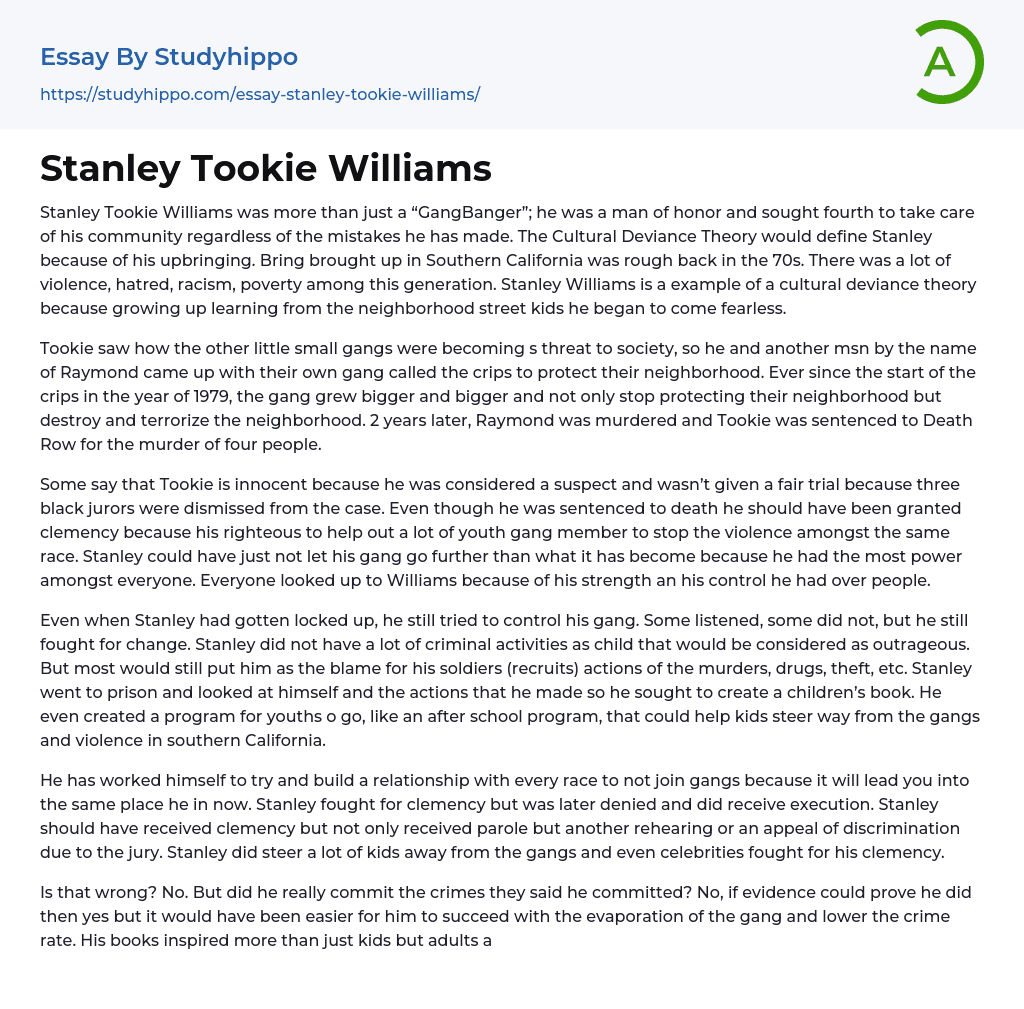Tookie observed that minor gangs were evolving into a societal menace, leading him and another man named Raymond to establish their own gang, the crips, in order to safeguard their community. Since its inception in 1979, the crips multiplied exponentially, eventually ceasing to defend their community and instead causing chaos and terror. Aft
...er two years, Raymond was killed and Tookie was sentenced to death row for four counts of murder.
Some argue that Tookie was wrongfully accused as he didn't receive a fair trial due to the dismissal of three black jurors from the case. Despite his death sentence, he merited clemency for his efforts in preventing youth gang violence within his own race. Williams, holding the most power among all, had the potential to curtail gang activities. His influence and control were admired by many.
Even during his incarceration, Stanley persisted in managing his crew. While some heeded his words, others did not, yet he continued to advocate for transformation. Stanley's childhood was not notably filled with severe criminal offenses, however, many still considered him accountable for his recruit's (soldiers) involvement in heinous crimes like murder, drug dealing, theft, and so on. Stanley introspected during
his time in prison and decided to write a children's book. He even developed a program similar to an after-school activity for young people. The program was designed to guide children away from the gang violence prevailing in southern California.
Stanley strived to build bridges with all ethnicities and discourage them from participating in gang activities, for he knew such a path would lead them to the same predicament he was in. Despite his efforts for clemency, they were turned down and he was ultimately executed. He merited clemency but was only given parole, an additional rehearing, or an appeal on grounds of bias by the jury. In his mission to divert many young individuals from joining gangs, Stanley even garnered support from celebrities who advocated for his clemency.
Is it incorrect? No. However, has he genuinely perpetrated the crimes as alleged? Without valid proof, no. Yet, if there was compelling evidence, then yes. It would have simplified his efforts to diminish the gang's dominance and reduce criminal activities. His literary works didn't merely inspire children but rather influenced adults too. Today, more parents engage in meaningful communication with their children thanks to him. Even neglected and impoverished areas are uniting to create organizations that aim to mitigate violence across all ethnicities, including their own.
(Note: The text given is an empty paragraph html tag. There's nothing toor unify)
- Animal Cruelty essays
- Law Enforcement essays
- Juvenile Justice System essays
- Surveillance essays
- Forensic Science essays
- Crime Prevention essays
- Criminal Justice essays
- Criminology essays
- Drug Trafficking essays
- Juvenile Delinquency essays
- Organized Crime essays
- Penology essays
- Prison essays
- Property Crime essays
- Punishment essays
- Serial Killer essays
- Sexual Offence essays
- Victim essays
- Crime scene essays
- Punishments essays
- Charles Manson essays
- Juvenile Crime essays
- Piracy essays
- Stealing essays
- Gang essays
- Hate Crime essays
- Homicide essays
- Damages essays
- Murder essays
- Robbery essays
- Ted Bundy essays
- Prostitution essays
- Violent crime essays
- Rape essays
- Identity Theft essays
- Sexual Harassment essays
- Distracted Driving essays
- Drunk Driving essays
- Detention essays
- Sexual Assault essays
- Sexual Assault on College Campuses essays
- Cyber Crime essays
- White Collar Crime essays
- Fur essays
- Federal Bureau Of Investigation essays
- Fire Department essays
- Criminal Justice System essays
- Commitment essays
- Mass Incarceration essays
- Kill essays




